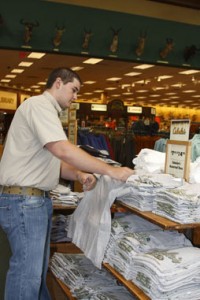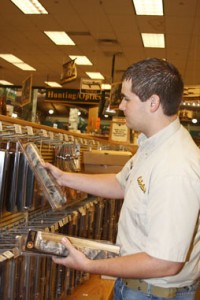By Rylie Parkins/ne news editor
(Part three in a four-part series on the turnover in jobs frequently held by students.)

Retail jobs may seem appealing, especially when compared to other industries, but the field is not all glitz and glam.
Many factors contribute to employee turnover in retail, including pressure from corporate to push products, rude customers, bad pay, bad management and poor hours.
The biggest reason for employee turnover in retail is that “hours are usually not flexible enough,” Haven Wynne, NE Campus student and Lifeway employee, said.
“The compensation in retail is pathetic,” she said. “Most retail jobs require a lot of selling, as well as several other tasks, and the pay just isn’t worth the work an employee puts into their job.”
Alex Bustos, NE Campus student and Sprint sales associate, agrees.
“The biggest reason for turnover is pay rate and bad hours. It is usually bad to work five hours one week and 40 hours the next week,” he said.
In addition to bad pay and hours, dealing with rude customers can make an associate want to quit on the spot.
“A misconception about my job is that it is easy to do,” Scott Seibert, NE Campus student and Cabela’s associate, said.
“You have to deal with people who argue, complain and do just plain annoying stuff,” he said.
The retail industry presents other problems too, such as pressure from the corporate office to sell various items to customers.
“Corporate sends down rules and tells us to push club cards harder,” Seibert said. “They don’t realize that the average customer does not want another credit card. You can only get so many people to sign up before the majority of the customers already have it.”
Wynne agrees with Seibert.
“I am frustrated that most retail businesses don’t pay their employees more or offer some sort of incentive to sell products,” she said.
As in any other industry, poor management is also a huge reason often cited for employee turnover.
“It is important to have an understanding and organized management,” Wynne said.
“I have been in a retail environment where the management team doesn’t really care about training their employees properly, and the team is very unorganized. That can be frustrating,” she said.

A good way to avoid employee turnover in retail is for management to keep its employees happy.
An easy way to do so is by making the employees feel appreciated.
An incentive program, such as Cabela’s “fish card,” is an effective way for management to show its appreciation.
“If you get caught doing something good, they give you a fish card worth five bucks on your next paycheck. If you save them up for a few months, you get a nice bonus on your check,” Seibert said.
Good pay and a relaxed work environment are a few other things that minimize turnover.
“Pay is the whole reason I started here,” Seibert said. “Not many places start off paying $9-$9.50 an hour for a new hire.”
“We have three personal days every year,” he said. “The environment is kind of chill up there. The managers aren’t breathing down your back all the time, and they only talk to you if you need something, which is nice.”
